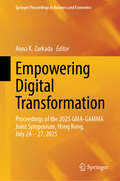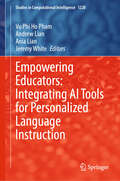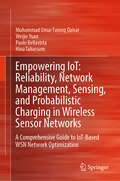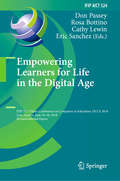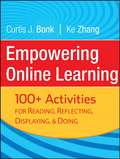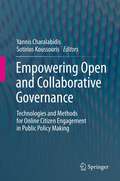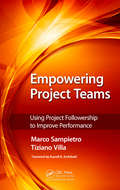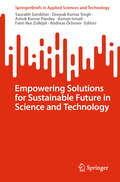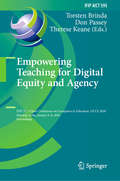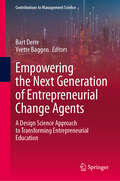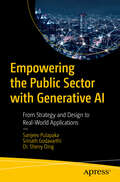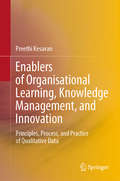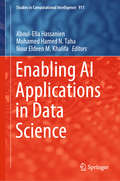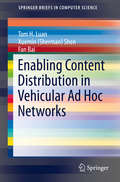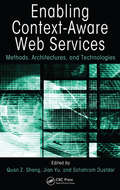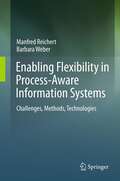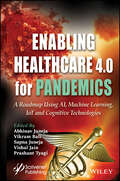- Table View
- List View
Empowering Digital Transformation: Proceedings of the 2025 GMA-GAMMA Joint Symposium, Hong Kong, July 24–27, 2025 (Springer Proceedings in Business and Economics)
by Anna K. ZarkadaThis book contains selected papers from the 2025 Greek Marketing Academy and the Global Alliance of Marketing and Management Associations Joint Symposium (GMA-GAMMA2025) held from July 24 to 27, 2025, in Hong Kong, China.It focuses on achieving a human-centered digital transformation by empowering people and integrating processes and platforms to foster sustainable prosperity for all. It challenges conventional thinking by offering novel conceptualizations, empirical evidence, and case studies from regions at various stages of digitalization and across different product, market, and industry contexts.The book aims to equip decision-makers and academics with the tools to navigate the increasingly blurred boundaries between humans and computers, businesses, institutions, and society, and the traditional, platform, attention, and experience economies. The chapters span operations, marketing, and management and bring together a variety of country context and industries undergoing digital transformation.
Empowering Educators: Integrating AI Tools for Personalized Language Instruction (Studies in Computational Intelligence #1228)
by Jeremy White Vu Phi Ho Pham Andrew Lian Ania LianThis book examines the use of AI technology, particularly ChatGPT, into English language education. This 15-chapter anthology examines the pedagogical, ethical, and cognitive aspects of AI-enhanced instruction, utilizing research from Vietnam and global contexts. Section I (Chapters 2–8), AI Integration in Language Teaching and Learning, analyzes the role of AI in language instruction and acquisition, encompassing emotional intelligence, rubric-based assessment, IELTS preparation, and educator identification. Section II (Chapters 9–13), AI-Enhanced Language Learning Skills and Practices, examines AI-augmented language learning methodologies, addressing vocabulary acquisition, learner independence, and chatbot-assisted education. Section III (Chapters 14–15), AI in Translation and Support Systems, examines artificial intelligence in translation and academic assistance systems. The book emphasizes the transformative potential as well as the dangers of excessive dependence, academic misconduct, and insufficient teacher training. Highlighting ethical integration and human–AI collaboration, it offers pragmatic ideas for educators, academics, and policymakers. Empowering educators envisions AI as a strategically—augmenting, not supplanting—teachers in the establishment of sustainable and inclusive language learning settings.
Empowering Human Dynamics Research with Social Media and Geospatial Data Analytics (Human Dynamics in Smart Cities)
by Atsushi Nara Ming-Hsiang TsouThis book discusses theoretical backgrounds, techniques and methodologies, and applications of the current state-of-the-art human dynamics research utilizing social media and geospatial big data. It describes various forms of social media and big data with location information, theory development, data collection and management techniques, and analytical methodologies to conduct human dynamics research including geographic information systems (GIS), spatiotemporal data analytics, text mining and semantic analysis, machine learning, trajectory data analysis, and geovisualization. The book also covers applied interdisciplinary research examples ranging from disaster management, public health, urban geography, and spatiotemporal information diffusion. By providing theoretical foundations, solid empirical research backgrounds, techniques, and methodologies as well as application examples from diverse interdisciplinary fields, this book will be a valuable resource to students, researchers and practitioners who utilize or plan to employ social media and big data in their work.
Empowering IoT: A Comprehensive Guide to IoT-Based WSN Network Optimization
by Paolo Bellavista Weijie Yuan Muhammad Umar Qaisar Hina TabassumThis book provides a comprehensive exploration of both fundamental principles and practical engineering techniques. It places a strong emphasis on several key areas, including load balancing for IoT sensor devices through effective network management to ensure robust communication reliability among these sensor devices. It also delves into the intricacies of efficient charging scheduling for sensor devices, using probabilistic approaches and integrated sensing and communication technologies to enhance network optimization. Central to the book's goals is its comprehensive and systematic treatment of practical challenges in IoT network optimization. This focus makes it particularly suitable for readers seeking practical solutions in this area. The book's target audience includes researchers, engineers, graduate students, and IoT industry professionals interested in areas such as reliability improvement, load balancing, charging scheduling, and network management. By providing both theoretical foundations and practical insights, this book serves as a valuable resource for those seeking to navigate the complexities of IoT network optimization.
Empowering Learners for Life in the Digital Age: IFIP TC 3 Open Conference on Computers in Education, OCCE 2018, Linz, Austria, June 24–28, 2018, Revised Selected Papers (IFIP Advances in Information and Communication Technology #524)
by Cathy Lewin Rosa Bottino Don Passey Eric SanchezThis book constitutes the refereed post-conference proceedings of the IFIP TC 3 Open Conference on Computers in Education, OCCE 2018, held in Linz, Austria, in June 2018.The 24 revised full papers and 3 short papers included in this volume were carefully reviewed and selected from 63 submissions during two rounds of reviewing. The papers discuss key emerging topics and evolving practices in the area of educational computing research. They are organized in the following topical sections: computational thinking; programming and computer science education; teachers’ education and professional development; games-based learning and gamification; learning in specific and disciplinary contexts; learning in social networking environments; and self-assessment, e-assessment and e-examinations.
Empowering Marketing and Sales with HubSpot: Take your business to a new level with HubSpot's inbound marketing, SEO, analytics, and sales tools
by Resa GoodingLeverage HubSpot to reach your target audience with the right content and convert them into loyal customersKey FeaturesExplore a full software stack for marketing, sales, and customer services to grow your businessUnderstand how to organize, track, and build better relationships with leads and customersLearn to prioritize and execute your marketing tasks in an efficient wayBook DescriptionEmpowering Marketing and Sales with HubSpot is your comprehensive solution to using HubSpot to achieve your business goals with a flexible and lean approach. With this book, you'll implement out-of-the-box solutions provided by HubSpot for sales and marketing professionals using all the tools needed to effectively manage your business campaigns, sales, and marketing automation processes.This book will take you through steps to ensure your investment in HubSpot pays off from Day 1. You'll learn how to set up HubSpot correctly and understand how to generate quick wins for your organization. Next, you will work with important HubSpot tools for SEO, social media, and ads. The book will also show you how to use HubSpot for conversational marketing and create a marketing funnel using HubSpot's lead capture and engagement tools. In addition to this, you will get to grips with building custom reports, dashboards, and notifications to stay on top of company marketing goals. Later, you will learn how to use HubSpot for inbound marketing and for every type of business, such as manufacturing, agriculture, and eCommerce.By the end of this HubSpot book, you will have the skills you need to be able to set up effective marketing campaigns and leverage the insights gleaned from sales efforts using just one platform.What you will learnExplore essential steps involved in implementing HubSpot correctlyBuild ideal marketing and sales campaigns for your organizationManage your sales process and empower your sales teams using HubSpotGet buy-in from your management and colleagues by setting up useful reportsUse Flywheel strategies to increase sales for your businessApply the inbound methodology to scale your marketingRe-engage your existing database using the HubSpot retargeting ads toolUnderstand how to use HubSpot for any B2B industry in which you operateWho this book is forThis HubSpot marketing book is for sales and marketing professionals, business owners, and entrepreneurs who want to use HubSpot for scaling their sales and marketing activities. A basic understanding of key marketing terms is required to get started with this book.
Empowering Novel Geometric Algebra for Graphics and Engineering: 7th International Workshop, ENGAGE 2022, Virtual Event, September 12, 2022, Proceedings (Lecture Notes in Computer Science #13862)
by George Papagiannakis Eckhard Hitzer Petr VasikThis book constitutes the proceedings of the Workshop Empowering Novel Geometric Algebra for Graphics and Engineering, ENGAGE 2022, held in conjunction with Computer Graphics International conference, CGI 2022, which took place virtually, in September 2022. The 10 full papers included in this volume were carefully reviewed and selected from 12 submissions. The workshop focused specifically on important aspects of geometric algebra including algebraic foundations, digitized transformations, orientation, conic fitting, protein modelling, digital twinning, and multidimensional signal processing.
Empowering Online Learning
by Curtis J. Bonk Ke ZhangThis is an essential resource for anyone designing or facilitating online learning. It introduces an easy, practical model (R2D2: read, reflect, display, and do) that will show online educators how to deliver content in ways that benefit all types of learners (visual, auditory, observational, and kinesthetic) from a wide variety of backgrounds and skill levels. With a solid theoretical foundation and concrete guidance and examples, this book can be used as a handy reference, a professional guidebook, or a course text. The authors intend for it to help online instructors and instructional designers as well as those contemplating such positions design, develop, and deliver learner-centered online instruction.Empowering Online Learning has 25 unique activities for each phase of the R2D2 model as well as summary tables helping you pick and choose what to use whenever you need it. Each activity lists a description, skills addressed, advice, variations, cost, risk, and time index, and much more.This title is loaded with current information about emerging technologies (e.g., simulations, podcasts, wikis, blogs) and the Web 2.0. With a useful model, more than 100 online activities, the latest information on emerging technologies, hundreds of quickly accessible Web resources, and relevance to all types and ages of learners--Empowering Online Learning is a book whose time has come.
Empowering Open and Collaborative Governance: Technologies and Methods for Online Citizen Engagement in Public Policy Making
by Yannis Charalabidis Sotirios KoussourisThe use of information and communication technologies to support public administrations, governments and decision makers has been recorded for more than 20 years and dubbed e-Government. Moving towards open governance roadmaps worldwide, electronic participation and citizen engagement stand out as a new domain, important both for decision makers and citizens; and over the last decade, there have been a variety of related pilot projects and innovative approaches. With contributions from leading researchers, Charalabidis and Koussouris provide the latest research findings such as theoretical foundations, principles, methodologies, architectures, technical frameworks, cases and lessons learnt within the domain of open, collaborative governance and online citizen engagement. The book is divided into three sections: Section one, "Public Policy Debate Foundations," lays the foundations regarding processes and methods for scoping, planning, evaluating and transforming citizen engagement. The second section, "Information and Communication Technologies for Citizen Participation," details practical approaches to designing and creating collaborative governance infrastructures and citizen participation for businesses and administrations. Lastly, the third section on "Future Research Directions of Open, Collaborative ICT-enabled Governance" provides a constructive critique of the developments in the past and presents prospects regarding future challenges and research directions. The book is mainly written for academic researchers and graduate students working in the computer, social, political and management sciences. Its audience includes researchers and practitioners in e-Governance, public administration officials, policy and decision makers at the local, national and international level engaged in the design and creation of policies and services, and ICT professionals engaged in e-Governance and policy modelling projects and solutions.
Empowering Organizations with Power Virtual Agents: A practical guide to building intelligent chatbots with Microsoft Power Platform
by Nicolae TarlaUnleash the capabilities of Power Virtual Agents to provide actionable insights to your customers and employees using automated chatbot solutionsKey FeaturesProvide instant customer support on your webpages using Power Virtual AgentsDiscover tips and techniques for the governance, administration, and deployment of chatbotsBuild conversational solutions for your web apps, public portals, and Teams environmentBook DescriptionPower Virtual Agents is a set of technologies released under the Power Platform umbrella by Microsoft. It allows non-developers to create solutions to automate customer interactions and provide services using a conversational interface, thus relieving the pressure on front-line staff providing this kind of support. Empowering Organizations with Power Virtual Agents is a guide to building chatbots that can be deployed to handle front desk services without having to write code. The book takes a scenario-based approach to implementing bot services and automation to serve employees in the organization and external customers. You will uncover the features available in Power Virtual Agents for creating bots that can be integrated into an organization's public site as well as specific web pages. Next, you will understand how to build bots and integrate them within the Teams environment for internal users. As you progress, you will explore complete examples for implementing automated agents (bots) that can be deployed on sites for interacting with external customers. By the end of this Power Virtual Agents chatbot book, you will have implemented several scenarios to serve external client requests for information, created scenarios to help internal users retrieve relevant information, and processed these in an automated conversational manner.What you will learnGet to grips with Power Virtual Agents and understand the license requirement for using itDeploy bots on public websites or web pagesCreate conversational solutions for your organization using Microsoft TeamsExplore best practices for governance that are essential for implementing Power Virtual AgentsExplore different business scenarios for implementing Power Virtual AgentsUnderstand the integration between Power Virtual Agents and Microsoft Power PlatformWho this book is forThis book is for organization representatives looking to automate processes, relieve the first-contact workload of their front-line agents, and provide actionable results to employees and customers. Business professionals, citizen developers, and functional consultants will also find this book helpful. Familiarity with the Modern Workplace and the Dynamics 365 family of products will be useful. Beginner-level knowledge of Power Platform and its main modules will assist with understanding the concepts covered in the book more effectively.
Empowering Project Teams: Using Project Followership to Improve Performance
by Tiziano Villa Marco SampietroExamining the project environment from the perspective of project team members, this book re-interprets project management methodologies and behaviors using a bottom-up approach. It explores the application of project followership in the key stages of project management and details the methods and techniques that all project team members need to know. Outlining the behaviors team members should adopt for project success, the text considers project closure and transfer and explains why this is an ideal time to evaluate if efforts invested have been rewarded.
Empowering Solutions for Sustainable Future in Science and Technology (SpringerBriefs in Applied Sciences and Technology)
by Andreas Öchsner Azman Ismail Ashok Kumar Pandey Fatin Nur Zulkipli Deepak Kumar Singh Saurabh SambhavThis book, embarks the reader on a journey into the forefront of innovation where science, engineering, and technology converge to address the pressing challenges of our time. Through a captivating exploration of cutting-edge research, real-world case studies, and visionary insights, this book illuminates the dynamic forces shaping our collective journey towards a more sustainable and prosperous future. The book also explores how breakthroughs in science, engineering, and technology are reshaping our world for the better. This book is beneficial for research scholar, undergraduate and postgraduate students, or industry staff. The book inspires and empowers readers to become catalysts for positive transformation in our communities and beyond.
Empowering Students With Technology
by Alan C. NovemberExpand classroom experiences and spark student excitement with learning adventures powered by technology! Demonstrating how technology can improve school performance, this second edition of the bestseller shows how computer and Internet technologies enhance students’ critical thinking, research, and problem-solving skills; level the learning field for disadvantaged students; and open doors for children who are disabled. Offering more than 50 Web sites, plus new resources, practical lesson ideas, sample activities, more information about online learning, and real-world examples, this timely revision examines: Information literacy Learning in a globally connected community Increased access to information Applications for digital cameras, fax machines, cell phones, and more
Empowering Teaching for Digital Equity and Agency: IFIP TC 3 Open Conference on Computers in Education, OCCE 2020, Mumbai, India, January 6–8, 2020, Proceedings (IFIP Advances in Information and Communication Technology #595)
by Torsten Brinda Don Passey Therese KeaneThis book constitutes the refereed post-conference proceedings of the IFIP TC 3 Open Conference on Computers in Education, OCCE 2020, held in Mumbai, India, in January 2020. The 11 full papers and 4 short papers included in this volume were carefully reviewed and selected from 57 submissions. The papers discuss key emerging topics and evolving practices in the area of educational computing research. They are organized in the following topical sections: computing education; learners’ and teachers’ perspectives; teacher professional development; the industry perspective; and further aspects.
Empowering the Next Generation of Entrepreneurial Change Agents: A Design Science Approach to Transforming Entrepreneurial Education (Contributions to Management Science)
by Bart Derre Yvette BaggenIn an era defined by volatility, complexity, and uncertainty, educating future-oriented change agents is essential to address pressing societal challenges such as climate change and the transition to a circular economy. These change agents play a pivotal role in driving societal transformation, requiring a mindset and skills suited to navigating complex problems and adapting to environments full of uncertainty. Entrepreneurial education emerges as a critical lever in fostering such capabilities, integrating seamlessly into higher education and lifelong learning contexts to prepare change agents for active, constructive participation in societal transitions. This book introduces a design-science research approach to entrepreneurial education, emphasizing the design, implementation, and evaluation of educational practices tailored to diverse contexts. Real-life case studies illustrate how the design-science approach has been successfully applied, offering practical insights for educators and researchers aiming to enhance their own research and teaching practices. By connecting theory to practice, the design-science approach offers a fresh perspective on entrepreneurial education. It not only unpacks the mechanisms behind effective program design but also fosters innovation through continuous, data-driven cycles of collecting and processing feedback. This approach ultimately enables the development of evidence-based entrepreneurial education that prepares change agents capable of driving the necessary societal transformation across contexts.
Empowering the Public Sector with Generative AI: From Strategy and Design to Real-World Applications
by Sanjeev Pulapaka Srinath Godavarthi Sherry DingThis is your guide book to Generative AI (GenAI) and its application in addressing real-world challenges within the public sector. The book addresses a range of topics from GenAI concepts and strategy to public sector use cases, architecture patterns, and implementation best practices. With a general background in technology and the public sector, you will be able to understand the concepts in this book. The book will help you develop a deeper understanding of GenAI and learn how GenAI differs from traditional AI. You will explore best practices such as prompt engineering, and fine-tuning, and architectural patterns such as Retrieval Augmented Generation (RAG). And you will discover specific nuances, considerations, and strategies for implementation in a public sector organization. You will understand how to apply these concepts in a public sector setting and address industry-specific challenges and problems by studying a variety of use cases included in the book in the areas of content generation, chatbots, summarization, and program management. What You Will Learn GenAI concepts and how GenAI differs from traditional AI/ML Prompt engineering, fine-tuning, RAG, and customizing foundation models Strategy, methodologies, and frameworks for the public sector Public sector use cases in the areas of content generation, summarization, and chatbots, plus program management, analytics, business intelligence, and reporting Architecture and design patterns Implementation, operations, and maintenance of GenAI applications Who This Book Is For Technology and business leaders in the public sector who are new to AI/ML and are keen on exploring and harnessing the potential of Generative AI in their respective organizations.
EnCase Computer Forensics -- The Official EnCE
by Steve BuntingThe official, Guidance Software-approved book on the newest EnCE exam!The EnCE exam tests that computer forensic analysts and examiners have thoroughly mastered computer investigation methodologies, as well as the use of Guidance Software's EnCase Forensic 7. The only official Guidance-endorsed study guide on the topic, this book prepares you for the exam with extensive coverage of all exam topics, real-world scenarios, hands-on exercises, up-to-date legal information, and sample evidence files, flashcards, and more. Guides readers through preparation for the newest EnCase Certified Examiner (EnCE) exam Prepares candidates for both Phase 1 and Phase 2 of the exam, as well as for practical use of the certification Covers identifying and searching hardware and files systems, handling evidence on the scene, and acquiring digital evidence using EnCase Forensic 7 Includes hands-on exercises, practice questions, and up-to-date legal information Sample evidence files, Sybex Test Engine, electronic flashcards, and more If you're preparing for the new EnCE exam, this is the study guide you need.
Enablers of Organisational Learning, Knowledge Management, and Innovation: Principles, Process, and Practice of Qualitative Data
by Preethi KesavanThis book establishes constructivist, interpretivist, and linguistic approaches based on conventions about the nature of qualitative and text data, the author’s influence on text interpretation, and the validity checks used to justify text interpretations. Vast quantities of text and qualitative data in organizations often go unexplored. Text analytics outlined in this book allow readers to understand the process of converting unstructured text data into meaningful data for analysis in order to measure employee opinions, feedback, and reviews through sentiment analysis to support fact-based decision making. The methods involve using NVivo and RapidMiner software to perform lexical analysis, categorization, clustering, pattern recognition, tagging, annotation, memo creation, information extraction, association analysis, and visualization. The methodological approach in the book uses innovation theory as a sensitizing concept to lay the foundation for the analysis of research data, suggesting approaches for empirical exploration of organizational learning, knowledge management, and innovation practices amongst geographically dispersed individuals and team members. Based on data obtained from a private educational organization that has offices dispersed across Asia through focus group discussions and interviews on these topics, the author highlights the need for integrating organizational learning, knowledge management, and innovation to improve organizational performance, exploring perspectives on collective relationships and networks, organizational characteristics and structures, and tacit and overt values which influence such innovation initiatives. In the process, the author puts forward a new theory which is built on three themes: relationship and networks, knowledge sharing mechanisms, and the role of social cognitive schema that facilitate emergent learning, knowledge management, and innovation.
Enabling 6G Mobile Networks
by Nikos Passas Jonathan Rodriguez Christos Verikoukis John S. VardakasThis book tackles the 6G odyssey, providing a concerted technology roadmap towards the 6G vision focused on the interoperability between the wireless and optical domain, including the benefits that are introduced through virtualization and software defined radio. The authors aim to be at the forefront of beyond 5G technologies by reflecting the integrated works of several major European collaborative projects (H2020-ETN-SECRET, 5GSTEPFWD, and SPOTLIGHT). The book is structured so as to provide insights towards the 6G horizon, reporting on the most recent developments on the international 6G research effort.The authors address a variety of telecom stakeholders, which includes practicing engineers on the field developing commercial solutions for 5G and beyond products; postgraduate researchers that require a basis on which to build their research by highlighting the current challenges on radio, optical and cloud-based networking for ultra-dense networks, including novel approaches; and project managers that could use the principles and applications for shaping new research proposals on this highly dynamic field.
Enabling AI Applications in Data Science (Studies in Computational Intelligence #911)
by Aboul-Ella Hassanien Nour Eldeen M. Khalifa Mohamed Hamed N. TahaThis book provides a detailed overview of the latest developments and applications in the field of artificial intelligence and data science. AI applications have achieved great accuracy and performance with the help of developments in data processing and storage. It has also gained strength through the amount and quality of data which is the main nucleus of data science. This book aims to provide the latest research findings in the field of artificial intelligence with data science.
Enabling Content Distribution in Vehicular Ad Hoc Networks
by Xuemin Sherman Shen Tom H. Luan Fan BaiThis SpringerBrief presents key enabling technologies and state-of-the-art research on delivering efficient content distribution services to fast moving vehicles. It describes recent research developments and proposals towards the efficient, resilient and scalable content distribution to vehicles through both infrastructure-based and infrastructure-less vehicular networks. The authors focus on the rich multimedia services provided by vehicular environment content distribution including vehicular communications and media playback, giving passengers many infotainment applications. Common problems of vehicular network research are addressed, including network design and optimization, standardization, and the adaptive playout from a user's perspective.
Enabling Context-Aware Web Services: Methods, Architectures, and Technologies
by Quan Z. Sheng Schahram Dustdar Jian YuWith recent advances in radio-frequency identification (RFID) technology, sensor networks, and enhanced Web services, the original World Wide Web is continuing its evolution into what is being called the Web of Things and Services. Such a Web will support an ultimately interactive environment where everyday physical objects such as buildings, sidew
Enabling Flexibility in Process-Aware Information Systems: Challenges, Methods, Technologies
by Barbara Weber Manfred ReichertIn today's dynamic business world, the success of a company increasingly depends on its ability to react to changes in its environment in a quick and flexible way. Companies have therefore identified process agility as a competitive advantage to address business trends like increasing product and service variability or faster time to market, and to ensure business IT alignment. Along this trend, a new generation of information systems has emerged--so-called process-aware information systems (PAIS), like workflow management systems, case handling tools, and service orchestration engines. With this book, Reichert and Weber address these flexibility needs and provide an overview of PAIS with a strong focus on methods and technologies fostering flexibility for all phases of the process lifecycle (i.e., modeling, configuration, execution and evolution). Their presentation is divided into six parts. Part I starts with an introduction of fundamental PAIS concepts and establishes the context of process flexibility in the light of practical scenarios. Part II focuses on flexibility support for pre-specified processes, the currently predominant paradigm in the field of business process management (BPM). Part III details flexibility support for loosely specified processes, which only partially specify the process model at build-time, while decisions regarding the exact specification of certain model parts are deferred to the run-time. Part IV deals with user- and data-driven processes, which aim at a tight integration of processes and data, and hence enable an increased flexibility compared to traditional PAIS. Part V introduces existing technologies and systems for the realization of a flexible PAIS. Finally, Part VI summarizes the main ideas of this book and gives an outlook on advanced flexibility issues. The book's target groups include researchers, PhD students and Master students in the field of information systems. After reading the book, they will better understand PAIS flexibility aspects. To support the easy use as a textbook, a series of exercises is provided at the end of each chapter and slides and further teaching material are available on the book's web site www.flexible-processes.com. Professionals specializing in business process management (BPM) who want to obtain a good understanding of flexibility challenges in BPM and state-of-the-art solutions will also benefit from the presentations of open source as well as commercial process management systems and related practical scenarios.
Enabling Healthcare 4.0 for Pandemics: A Roadmap Using AI, Machine Learning, IoT and Cognitive Technologies
by Prashant Tyagi Vishal Jain Vikram Bali Abhinav Juneja Sapna JunejaIn this timely book, the editors explore the current state of practice in Healthcare 4.0 and provide a roadmap for harnessing artificial intelligence, machine learning, and Internet of Things, as well as other modern cognitive technologies, to aid in dealing with the various aspects of an emergency pandemic outbreak. There is a need to improvise health care systems with the intervention of modern computing and data management platforms to increase the reliability of human processes and life expectancy. There is an urgent need to come up with smart IoT-based systems which can aid in the detection, prevention and cure of these pandemics with more precision. There are a lot of challenges to overcome but this book proposes a new approach to organize the technological warfare for tackling future pandemics
Enabling Industry 4.0 through Advances in Manufacturing and Materials: Selected Articles from iM3F 2021, Malaysia (Lecture Notes in Mechanical Engineering)
by Muhammed Nafis Osman Zahid Amiril Sahab Abdul Sani Mohamad Rusydi Mohamad Yasin Faiz Mohd Turan Siti Zubaidah Ismail Mohd Zairulnizam Mohd Zawawi Ahmad Rosli Abdul Manaf Siti Nadiah Mohd Saffe Radhiyah Abd AzizThis book presents part of the proceedings of the Manufacturing and Materials track of the iM3F 2021 conference held in Malaysia. This collection of articles deliberates on the key challenges and trends related to manufacturing as well as materials engineering and technology in setting the stage for the world in embracing the Fourth Industrial Revolution. It presents recent findings with regard to manufacturing and materials that are pertinent toward the realizations and ultimately the embodiment of Industry 4.0, with contributions from both industry and academia.
